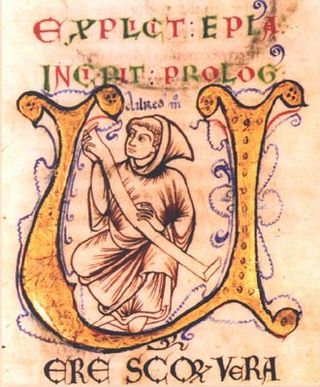Related Research Articles

In Ancient Roman architecture, a basilica was a large public building with multiple functions that was typically built alongside the town's forum. The basilica was in the Latin West equivalent to a stoa in the Greek East. The building gave its name to the architectural form of the basilica.

Lucius Annaeus Seneca the Younger, usually known mononymously as Seneca, was a Stoic philosopher of Ancient Rome, a statesman, dramatist, and in one work, satirist, from the post-Augustan age of Latin literature.
In Greek mythology, Erebus, or Erebos, is the personification of darkness. In Hesiod's Theogony, he is the offspring of Chaos, and the father of Aether and Hemera (Day) by Nyx (Night); in other Greek cosmogonies, he is the father of Aether, Eros, and Metis, or the first ruler of the gods. In genealogies given by Roman authors, he begets a large progeny of personifications upon Nox, while in an Orphic theogony he is the offspring of Chronos (Time). The name "Erebus" is also used to refer either to the darkness of the Underworld, the Underworld itself, or the region through which souls pass to reach Hades, and can sometimes be used as a synonym for Tartarus or Hades.
Claudius Claudianus, known in English as Claudian, was a Latin poet associated with the court of the Roman emperor Honorius at Mediolanum (Milan), and particularly with the general Stilicho. His work, written almost entirely in hexameters or elegiac couplets, falls into three main categories: poems for Honorius, poems for Stilicho, and mythological epic.
Gnaeus Calpurnius Piso, was a Roman statesman during the reigns of Augustus and Tiberius. He served as consul in 7 BC, after which he was appointed governor of Hispania and consul of Africa. Piso is best known for being accused of poisoning and killing Germanicus, the heir of emperor Tiberius.
Lucius Annaeus Seneca the Elder, also known as Seneca the Rhetorician, was a Roman writer, born of a wealthy equestrian family of Corduba, Hispania. He wrote a collection of reminiscences about the Roman schools of rhetoric, six books of which are extant in a more or less complete state and five others in epitome only. His principal work, a history of Roman affairs from the beginning of the Civil Wars until the last years of his life, is almost entirely lost to posterity. Seneca lived through the reigns of three significant emperors; Augustus, Tiberius and Caligula. He was the father of Lucius Junius Gallio Annaeanus, best known as a Proconsul of Achaia; his second son was the dramatist and Stoic philosopher Seneca the Younger (Lucius), who was tutor of Nero, and his third son, Marcus Annaeus Mela, became the father of the poet Lucan.

Gaius Julius Phaedrus, or Phaeder was a 1st-century AD Roman fabulist and the first versifier of a collection of Aesop's fables into Latin. Nothing is recorded of his life except for what can be inferred from his poems, and there was little mention of his work during late antiquity. It was not until the discovery of a few imperfect manuscripts during and following the Renaissance that his importance emerged, both as an author and in the transmission of the fables.

The mos maiorum is the unwritten code from which the ancient Romans derived their social norms. It is the core concept of Roman traditionalism, distinguished from but in dynamic complement to written law. The mos maiorum was collectively the time-honoured principles, behavioural models, and social practices that affected private, political, and military life in ancient Rome.

Aelred of Rievaulx, O Cist. ; also Ailred, Ælred, and Æthelred; was an English Cistercian monk, abbot of Rievaulx from 1147 until his death, and known as a writer. He is regarded by Anglicans and Catholics as a saint.
Titus Pomponius Atticus was a Roman editor, banker, and patron of letters, best known for his correspondence and close friendship with prominent Roman statesman Marcus Tullius Cicero. Atticus was from a wealthy Roman family of the equestrian class and from the Pomponia gens.

The Principate is the form of imperial government of the Roman Empire from the beginning of the reign of Augustus in 27 BC to the end of the Crisis of the Third Century in AD 284, after which it evolved into the Dominate.

Panaetius of Rhodes was an ancient Greek Stoic philosopher. He was a pupil of Diogenes of Babylon and Antipater of Tarsus in Athens, before moving to Rome where he did much to introduce Stoic doctrines to the city, thanks to the patronage of Scipio Aemilianus. After the death of Scipio in 129 BC, he returned to the Stoic school in Athens, and was its last undisputed scholarch. With Panaetius, Stoicism became much more eclectic. His most famous work was his On Duties, the principal source used by Cicero in his own work of the same name.

Julia was the daughter of Roman dictator Julius Caesar by his first or second wife Cornelia, and his only child from his marriages. Julia became the fourth wife of Pompey the Great and was renowned for her beauty and virtue.
Elaine Fantham was a British-Canadian classicist whose expertise lay particularly in Latin literature, especially comedy, epic poetry and rhetoric, and in the social history of Roman women. Much of her work was concerned with the intersection of literature and Greek and Roman history. She spoke fluent Italian, German and French and presented lectures and conference papers around the world—including in Germany, Italy, the Netherlands, Norway, Argentina, and Australia.

Stoicism is a school of Hellenistic philosophy that flourished in Ancient Greece and Ancient Rome. The Stoics believed that the practice of virtue is enough to achieve eudaimonia: a well-lived, flourishing life. The Stoics identified the path to achieving it with a life spent practicing certain virtues in everyday life such as courage or temperance and living in accordance with nature. It was founded in the ancient Agora of Athens by Zeno of Citium around 300 BC.

Patronage (clientela) was the distinctive relationship in ancient Roman society between the patronus ("patron") and their cliens ("client"). The relationship was hierarchical, but obligations were mutual. The patron was the protector, sponsor, and benefactor of the client; the technical term for this protection was patrocinium. Although typically the client was of inferior social class, a patron and client might even hold the same social rank, but the former would possess greater wealth, power, or prestige that enabled him to help or do favors for the client. From the emperor at the top to the commoner at the bottom, the bonds between these groups found formal expression in legal definition of patrons' responsibilities to clients. Patronage relationship were not exclusively between two people and also existed between a general and his soldiers, a founder and colonists, and a conqueror and a dependent foreign community.

De Beneficiis is a first-century work by Seneca the Younger. It forms part of a series of moral essays composed by Seneca. De Beneficiis concerns the award and reception of gifts and favours within society, and examines the complex nature and role of gratitude within the context of Stoic ethics.

De Clementia is a two volume (incomplete) hortatory essay written in AD 55–56 by Seneca the Younger, a Roman Stoic philosopher, to the emperor Nero in the first five years of his reign.

De Tranquillitate Animi is a Latin work by the Stoic philosopher Seneca. The dialogue concerns the state of mind of Seneca's friend Annaeus Serenus, and how to cure Serenus of anxiety, worry and disgust with life.
References
- ↑ L. Annaeus Seneca. De Beneficiis. 6.34.
{{cite book}}: CS1 maint: location (link) - ↑ Nicholas Purcell, "Amicus Augusti", in The Oxford Classical Dictionary, 4th ed. (Oxford University Press, 2012).
- ↑ Howard Hayes Scullard and Andrew William Lintott, "Amicitia", in The Oxford Classical Dictionary, 4th ed. (Oxford University Press, 2012).